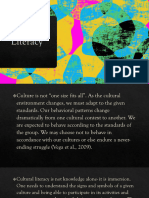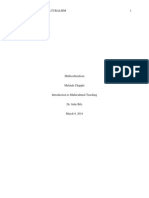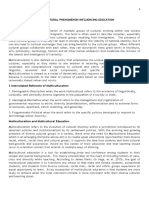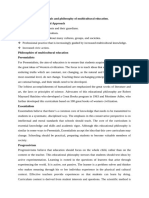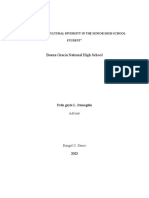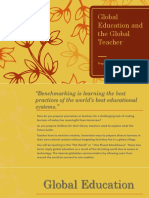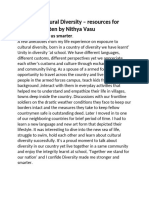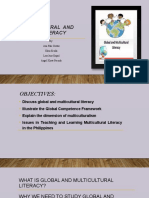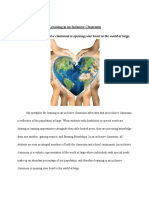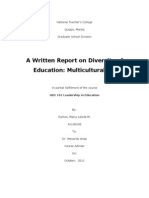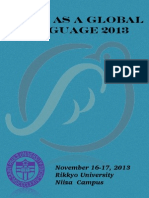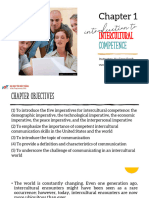Role of Teacher and Teacher Education in Multicultural Society
Role of Teacher and Teacher Education in Multicultural Society
Uploaded by
muhammad abbasCopyright:
Available Formats
Role of Teacher and Teacher Education in Multicultural Society
Role of Teacher and Teacher Education in Multicultural Society
Uploaded by
muhammad abbasOriginal Description:
Original Title
Copyright
Available Formats
Share this document
Did you find this document useful?
Is this content inappropriate?
Copyright:
Available Formats
Role of Teacher and Teacher Education in Multicultural Society
Role of Teacher and Teacher Education in Multicultural Society
Uploaded by
muhammad abbasCopyright:
Available Formats
Volume-04 ISSN: 2455-3085 (Online)
Issue-01 RESEARCH REVIEW International Journal of Multidisciplinary
January -2019 www.rrjournals.com [UGC Listed Journal]
Role of Teacher and Teacher Education in Multicultural Society
Dr. Reetu Sharma
Assistant Professor, Bhavan’s Leelavati Munshi College of Education, Bharatiya Vidya Bhavan, K.G. Marg, New Delhi (India)
ARTICLE DETAILS ABSTRACT
Article History Cultural diversity or multicultural society has been the main challenge in imparting the
Published Online: 20 January 2019 education. It is challenging task for the teachers to cope up with students belonging to
different societies. It becomes the responsibility of the teacher to meet the needs of
Keywords students from the culturally diverse societies. Teachers need to be trained in such a way to
Multicultural society, Cultural overcome these difficulties that they face because of the persistence of cultural diversity. In
Diversity, culturally diverse society, this paper discussion is made upon the role of teacher and teacher education in culturally
Role of teacher, Role of teacher
diverse society.
education
*
Corresponding Author
Email: reetusharma25[at]gmail.com
1. Introduction traditions and even there are significant variations in the way
The process of acquiring knowledge, skills and experience societies organize themselves, in their shared conception
by an individual is basically known as „Education‟. Education of morality, and in the ways they interact with their environment
makes an individual civilized and cultured. Cultural diversity or too. “Different groups have different needs and groups are also
multicultural society has been the main challenge in imparting made up of individuals with differing needs. However,
the education. Cultural diversity is basically the quality of recognizing similarities means that individuals can come to
different cultures. There are different societies that differed know that they often have something in common with
distinctly from each other and many of these differences persist individuals from other groups. Everyone is a member of a wide
till today. As cultural diversity is a challenge in teaching learning variety of groups, but no one group solely defines a
process, it is not an easy task for a teacher to educate an person. Learning about the diversity within groups helps break
increasingly diverse student population in school. It becomes down the propensity to stereotype. Identities are complex and
the responsibility of the teacher to meet the needs of students layered: and every individual has differences from others within
from the culturally diverse societies. Teachers need to behave their groups, as well as commonalties with those from different
in such a way to overcome these difficulties that they face groupings.” (DICE, 2008:29–30).
because of the persistence of cultural diversity. Hargreaves
(1993) emphasized on the importance of teachers by 3. Teacher’s role in Multicultural Society
mentioning that the teachers as the ultimate key to social Dr. A.P.J. Abdul Kalam has marked in his book “India
change and school improvement since they define, develop 2020: A Vision of the New Millennium‟ that “If you are a teacher
and reinterpret the curriculum.This makes the role of teachers in whatever capacity, you have a very special role to play
more challenging. Many challenges are faced by the teachers because more than anybody else it is you who are shaping the
and teaching learning process in this ever changing society as future generation. A teacher has a higher responsibility as
a teacher has to deal with different student having different compared to other professionals as students look upon the
culture. So it becomes important to understand this cultural teacher as an embodiment of perfection.” This makes the role
diversity because “Understanding of the cultural diversity of of teachers more responsible and challenging. A teacher may
contemporary society means increasing the possibility of have the following role in a multicultural society –
communication between people of different cultures, creating
positive attitudes towards cultural diversity, increasing social 3.1 Fostering cultural awareness
interaction between culturally different people and groups” Teachers should actively exhibit that they actually care
(Sedano, 2002:268). about all the needs of their students i.e. cultural, emotional, and
intellectual needs to foster a cultural awareness in their
2. Cultural diversity classroom. This can be used to build trusting relationships with
Cultural diversity is basically the quality of different diverse students.
cultures. It can also refer to having different cultures respect
3.2 Having Interest in the ethnic background of students:
each other's differences. Cultural diversity is sometimes used
to mean the variety of human societies or cultures in a specific Teachers should encourage their students to research and
region or in the world itself too. There are different societies also share information about their ethnic background in order to
that differed distinctly from each other and many of these develop a gullible relationship with their fellow classmates. They
differences persist till today. The more obvious cultural should analyze and celebrate differences in different traditions,
differences exist between people such as language, dress and
RRIJM 2015, All Rights Reserved 870 | P a g e
Volume-04, Issue-01, January-2019 RESEARCH REVIEW International Journal of Multidisciplinary
beliefs, and social behaviors which are very important to students have either little or no exposure to the people of other
develop an actually culturally responsive classroom. cultures. “Teachers' attitudes and perceptions about students
from diverse cultures play a major role in their expectations of
3.3 Transaction from instructor to facilitator: students”(Gollnick& Chinn, 1986; Hernandez, 1989), Education
A teacher should shift his / her role from instructor to students must understand as well as appreciate human
facilitator to create a nurturing environment in culturally diverse diversity in order to be effective and impartial teachers.
classroom. Students may display negative behaviors as a result
of a perceived sense of social injustice in an authoritarian 3.9 Cross-cultural communication:
classroom. So the teacher must acts more like a facilitator than The opportunity of direct interpersonal contact and gain
an instructor. knowledge of the history and culture of diverse groups should
be provided to the teachers in order to evolve appreciation and
3.4 Sensitivity to language concerns: better understanding regarding culture of diverse groups. A
In classrooms some students are not native English teacher must act as effective cross-cultural communicators.
speakers. They often feel marginalized. They even feel Cross-cultural communication skill needs an understanding of
pressured to discard their original language in favor of English. the interrelationship between language and cultural meaning.
Diversity of language is celebrated in a culturally diverse “Understanding how culture shapes what can be
classroom. The level of instructional materials provided to these communicated, how much is assumed to be known by the
students is tailored to level of their need by the teacher. Other listener, and how much must be overly conveyed promotes
study material is also provided in the primary language of effective cross-cultural communication” (Hall, 1989; Bonvillain,
student by the teacher. 1993).
3.5 Incorporation of self-testing methods: 4. Teacher Education and Culturally diverse society
As in traditional classrooms testing is usually linked with Teacher education plays an important role in culturally
grades, a teacher can use some non-graded tests to check the diverse society. The main goal of teacher education is to train
progress of the students in a culturally diverse classroom the future teachers thus it becomes the responsibility of teacher
keeping in mind their diversity education to inculcate the capabilities to deal with culturally
diverse society in them. As cultural diversity is a challenge in
3.6 Maintaining an “inclusive” curriculum : teaching learning process, it is not an easy task for a teacher to
educate an increasingly diverse student population in schools.
A teacher should maintain an inclusive curriculum that
Effective teaching in culturally diverse classrooms means-
remains respectful of differences for culturally diverse class. A
To use culturally sensitive content and strategies
culturally responsive curriculum is that which ensures that all
To ensure equitable opportunities for individual
students are included within all aspects of the school. A
fulfillment, academic success and personal
culturally responsive curriculum encourages the understanding
development for every student
of teachers about different cultures as well as the recognition of
Need to be "knowledgeable about how minority
cultural life of every student.
children perceive the world, and process and organize
information" (Irvine, 1990)
3.7 Need to become a reflective practitioner:
A reflective practitioner or a reflective teacher applies The main objective of teacher education is to train the
observational, empirical, and analytical skills in order to future teachers by developing specific skills of teaching in them,
evaluate and revise their own teaching practices (Irvine, 1990). to prepare them for facing the diverse situations in their real
Reflective teachers develop the awareness of their own cultural class room. „It is more important for educators to understand the
perspective and realize that it is not the universal norm which is cultural norms of the community than to learn specific skills‟
the perspective of their culture and even it is not the only right (Wiggins and Follo, 1999). Teachers need to be exposed to a
one. Teachers need meta-cognitive strategies for being aware combination of multicultural course work, field experiences,
of their own knowledge and skills in the classroom as well as modeling by successful practicing teachers (Baldwin, Buchanan
the efficacy of activities done by them on students' learning & Rudisill, 2007). The multicultural education is to give equal
(Cardelle-Elawar, 1992). opportunity experience to the students from diverse racial,
ethnic and social class groups.
3.8 Cultural competence:
Teachers must have cultural competence i.e. the ability to While providing teacher education these qualities should
function effectively in cross-cultural settings. They have to be inculcated in a teacher who is dealing with the culturally
interact pleasantly with people from different cultures which diverse society -
differ from their own. According to (Giles, Coupland, Williams, &
Leets, 1991)“culturally competent individuals (a) cope A teacher needs to become a reflective practitioner.
effectively with the psychological and emotional stress of Teacher candidates need meta-cognitive strategies for
dealing with the unfamiliar, (b) quickly establish rapport with being aware of their own knowledge and skills in the
others, (c) sense other people's feelings, (d) communicate classroom as well as the efficacy of activities done by
effectively with people from varying backgrounds, and (e) them on students' learning (Cardelle-Elawar, 1992)
respond adequately to miscommunication”. Many education
RRIJM 2015, All Rights Reserved 871 | Page
Volume-04, Issue-01, January-2019 RESEARCH REVIEW International Journal of Multidisciplinary
Teacher candidates must have cultural competence i.e. about the needs of different types of children and should
the ability to function effectively in cross-cultural settings. be prepared for the challenges he/she would be going to
So in teacher education the teacher candidates should be face in inclusive classroom.
provided with the opportunity to develop their cultural
competence. 5. Conclusion
A Teacher needs to have the specific skills and training to
Many education students have either little or no exposure adjust in their real class room situation. Cultural diversity is a
to the people of other cultures. “Teachers' attitudes and challenge for teachers to manage in the class room situations.
perceptions about students from diverse cultures play a The role of teacher in cultural diverse society can be- Fostering
major role in their expectations of students” (Gollnick & cultural awareness, Expressing interest in the ethnic
Chinn, 1986; Hernandez, 1989). Education students must background of students, From instructor to facilitator,
understand as well as appreciate human diversity in order Maintaining strict level of sensitivity to language concerns,
to be effective and impartial teachers. The opportunity of Incorporation of self-testing methods, Maintaining an “inclusive”
direct interpersonal contact and gain knowledge of the curriculum, being reflective practitioner, having cultural
history and culture of diverse groups should be provided competence, cross cultural communication skill, understanding
to the future teachers in order to evolve appreciation and and appreciation of other culture etc. in order to deal with the
better understanding regarding culture of diverse groups. culturally diverse class room.
In teacher education, there is need to train future teachers A teacher has to face the challenge to deal with the
as effective cross-cultural communicators. Cross-cultural students from different cultural in the same class room. Teacher
communication skill needs an understanding of the education provides the future teachers with specific skills and
interrelationship between language and cultural meaning. trains them to adjust in their real class room situation. Cultural
“Understanding how culture shapes what can be diversity is a challenge for teachers to manage in the class
communicated, how much is assumed to be known by the room. The role of teacher education in cultural diverse society
listener, and how much must be overly conveyed can be to preparing future teachers for dealing with the
promotes effective cross-cultural communication” (Hall, culturally diverse society by developing the qualities like
1989; Bonvillain, 1993). reflective practitioner, cultural competence, cross cultural
communication skill, understanding and appreciation of other
A future teacher must be aware with the concept of culture etc. in them.
inclusive education. He /she must have the knowledge
References
1. Baldwin, S. C., Buchanan, A. M., & Rudisill, M. E. (2007). settings', Policy & Practice: A Development Education
What teacher candidates learned about diversity, social Review, Vol. 7, Autumn, pp. 5-17.
justice, and themselves from service-learning experiences. 7. Hall, E. T. (1989). Unstated features of the cultural context of
Journal of Teacher Education, 58(4), 315-327. learning. The Educational Forum, 54 (1), pp. 21-34.
2. Banks, J. A. (2015). Cultural diversity and education. 8. Hargreaves, D. (1993), „Introduction‟, in M. Huberman (Ed.),
Routledge. The lives of teachers.London: Cassell.
3. Bonvillain, N. (1993). Language, culture and communication: 9. Irvine, J. J. (1990). Transforming teaching for the twenty-first
The meaning of messages. Englewood Cliffs, NJ: Prentice century. Educational Horizons, Fall, 16-21.
Hall. 10. Sedano, A M (2002) „Teacher Training and Intercultural
4. Cardelle-Elawar, M. (1992). The metacognitive teacher as a Education‟ in Del Canto, AC, et al. (eds.), Intercultural
multicultural educator. SCOPE, 91 (3), pp. 6-12. education: A Present-Day Challenge for Europe, Madrid:
5. DICE (2008) Global Dimensions: A Guide to Good Practice in Comunidad de Madrid.
Development Education and Intercultural Education for 11. Wiggins, R. A., & Follo, E. J. (1999). Development of
Teacher Educators, Dublin: DICE. knowledge, attitudes, and commitment to teach diverse
6. Fiedler, M (2008) 'Teaching and learning about the world in student populations. Journal of Teacher Education, 50(2), 94-
the classroom: Development education in culturally diverse 105.
RRIJM 2015, All Rights Reserved 872 | Page
You might also like
- Teaching English To Young Learners Critical Issues in Language Teaching With 3to12 Year OldsDocument321 pagesTeaching English To Young Learners Critical Issues in Language Teaching With 3to12 Year OldsTeacher Flávia100% (2)
- EDU 103 H3 Role of A Teacher in A Changing WorldDocument7 pagesEDU 103 H3 Role of A Teacher in A Changing WorldRyann LavapieNo ratings yet
- Teaching in DiversityDocument12 pagesTeaching in DiversityBertrand Aldous Santillan100% (1)
- Multiculturalism To Address The Classroom Diversity: Sushil Kumar Tiwari and Dori LalDocument6 pagesMulticulturalism To Address The Classroom Diversity: Sushil Kumar Tiwari and Dori LalSakshi SadhanaNo ratings yet
- Culture, Personality, and EducationDocument41 pagesCulture, Personality, and EducationHannah AGNo ratings yet
- Analyzing Classroom Diversity and Its Contribution To Multicultural Education in IndonesiaDocument5 pagesAnalyzing Classroom Diversity and Its Contribution To Multicultural Education in IndonesiaLittle NewtonNo ratings yet
- Teaching Strategies in A Multicultural Classroom: Prachi NaddaDocument4 pagesTeaching Strategies in A Multicultural Classroom: Prachi NaddaRobert SolisNo ratings yet
- Culture, Personality, and EducationDocument41 pagesCulture, Personality, and EducationHannah AGNo ratings yet
- Teaching Strategies in A Multicultural Classroom: Prachi NaddaDocument3 pagesTeaching Strategies in A Multicultural Classroom: Prachi NaddaRobert SolisNo ratings yet
- Cultural Literacy and Multicultural LiteracyDocument25 pagesCultural Literacy and Multicultural Literacyhcb4341No ratings yet
- Multicultural EducationDocument41 pagesMulticultural EducationMark Jade Panis100% (1)
- Cultural Dimensions of LearningDocument3 pagesCultural Dimensions of Learningapi-26570979100% (5)
- Article ReadingDocument7 pagesArticle Readingapi-289249800No ratings yet
- Please Mind The Culture Gap: Intercultural Development During A Teacher Education Study Abroad ProgramDocument13 pagesPlease Mind The Culture Gap: Intercultural Development During A Teacher Education Study Abroad ProgramFederico DamonteNo ratings yet
- Multicultural Perspective Lesson 2Document23 pagesMulticultural Perspective Lesson 2Ameil OrindayNo ratings yet
- MULTICULTURALISM FinalDocument34 pagesMULTICULTURALISM FinalDominic Rito100% (1)
- Multiculturalism Project 2Document10 pagesMulticulturalism Project 2api-247283121No ratings yet
- Diversity BriefDocument16 pagesDiversity Briefapi-253748903No ratings yet
- Menumbuhkan Sikap Multikultural Melalui Internalisasi Nilai-Nilai Multikultural Dalam Pembelajaran IpsDocument11 pagesMenumbuhkan Sikap Multikultural Melalui Internalisasi Nilai-Nilai Multikultural Dalam Pembelajaran IpsRizqia Nova SellaNo ratings yet
- Pages_013-022Document11 pagesPages_013-022jd380403No ratings yet
- Cultural Proficiency ResourcesDocument5 pagesCultural Proficiency Resourcesapi-240756804No ratings yet
- 2 Eed 15 ModuleDocument31 pages2 Eed 15 ModuleNor-inNo ratings yet
- Socio-Cultural Phenomenon Influencing EducationDocument4 pagesSocio-Cultural Phenomenon Influencing Educationofelia acostaNo ratings yet
- Culturally Responsive Final PaperDocument7 pagesCulturally Responsive Final Paperirenealarcon7No ratings yet
- Building and Enhancing New Literacies Across The CurriculumDocument2 pagesBuilding and Enhancing New Literacies Across The CurriculumAdora ortegoNo ratings yet
- Hamza MulticultureDocument6 pagesHamza Multicultureabelermias24No ratings yet
- Social Dimension PresentationDocument22 pagesSocial Dimension PresentationyokaribabeNo ratings yet
- Cultural Diversity 205Document18 pagesCultural Diversity 205Allana PonceNo ratings yet
- Apa Style Research PaperDocument8 pagesApa Style Research Paperapi-285764725No ratings yet
- Reading 7 6 Ways To Implement A Real Multicultural Education in The ClassroomDocument3 pagesReading 7 6 Ways To Implement A Real Multicultural Education in The ClassroomAizuddin bin RojalaiNo ratings yet
- Chapter 1-3 - RangelDocument17 pagesChapter 1-3 - Rangelraisy jane senocNo ratings yet
- Module 7 Week 9aDocument6 pagesModule 7 Week 9aGenesis ImperialNo ratings yet
- MULTICULTURALDocument21 pagesMULTICULTURALRhea Jane TanNo ratings yet
- MCE ReportDocument17 pagesMCE ReportFloramie OmayaoNo ratings yet
- Cultural Diversity in The ClassroomDocument2 pagesCultural Diversity in The ClassroomRuth Macasa Pangilinan100% (1)
- Amy EduDocument12 pagesAmy EduMuhammad HilmiNo ratings yet
- Addressing Literacy Needs in Culturally and LinguisticallyDocument28 pagesAddressing Literacy Needs in Culturally and LinguisticallyPerry Arcilla SerapioNo ratings yet
- Multicultural Education GoalsDocument8 pagesMulticultural Education GoalsfloradawatNo ratings yet
- Running Head: Culturally Responsive Classrooms: Why Multiculturalism Cooper 1Document5 pagesRunning Head: Culturally Responsive Classrooms: Why Multiculturalism Cooper 1api-404803522No ratings yet
- GABASA-FS1-Episode 3Document21 pagesGABASA-FS1-Episode 3Hannah Mae GabasaNo ratings yet
- Handling Cultural DiversityDocument7 pagesHandling Cultural DiversityNithya VasuNo ratings yet
- Activity.5 MulticulturalismDocument3 pagesActivity.5 MulticulturalismGARCIA EmilyNo ratings yet
- Reviewer LS3Document20 pagesReviewer LS3workwithericajaneNo ratings yet
- MAHALDocument5 pagesMAHALDonayre SevillaNo ratings yet
- Group 1 Multicultural and Global LiteracyDocument27 pagesGroup 1 Multicultural and Global Literacykat suNo ratings yet
- Group 5 Leader: Niño Lito Donayre Sevilla: MulticulturalismDocument5 pagesGroup 5 Leader: Niño Lito Donayre Sevilla: MulticulturalismDonayre SevillaNo ratings yet
- Faculty Awareness On Cultural Diversity of LearnersDocument11 pagesFaculty Awareness On Cultural Diversity of LearnersSuzane Tipan100% (2)
- Jurnal 4 PDFDocument12 pagesJurnal 4 PDFMuhammad BasoriNo ratings yet
- VALUES ED. - ValenzuelaDocument18 pagesVALUES ED. - ValenzuelaAnne CaNo ratings yet
- Infusing Tolerance, Diversity, and SocialDocument14 pagesInfusing Tolerance, Diversity, and SocialRosyada Amiirul HajjNo ratings yet
- Benlac U3 L10-11Document24 pagesBenlac U3 L10-11Van Errl Nicolai SantosNo ratings yet
- ELC101 - Episode 3KDocument6 pagesELC101 - Episode 3KJuzwa MaramotNo ratings yet
- Prof Ed 5 MidtermDocument25 pagesProf Ed 5 MidtermDojonel ValdezNo ratings yet
- A2 Research On Culture-Cultural DiversityDocument2 pagesA2 Research On Culture-Cultural DiversityNorielyn RodriguezNo ratings yet
- Ped 4142 Learning in An Inclusive Classroom - Gina MorphyDocument4 pagesPed 4142 Learning in An Inclusive Classroom - Gina Morphyapi-252825989No ratings yet
- Group 2Document35 pagesGroup 2Random PersonNo ratings yet
- 46 Challenges and Benefits of Multicultural Education Farah Latif NazDocument12 pages46 Challenges and Benefits of Multicultural Education Farah Latif NazlehakwelebekoNo ratings yet
- DRAFT1Document22 pagesDRAFT1Lyka Maun trinidadNo ratings yet
- Global TeachersDocument8 pagesGlobal TeachersAkari Chan100% (2)
- Written Report DiversityDocument11 pagesWritten Report DiversityUJ TeilNo ratings yet
- Connecting Readers to Multiple Perspectives: Using Culturally Relevant Pedagogy in a Multicultural ClassroomFrom EverandConnecting Readers to Multiple Perspectives: Using Culturally Relevant Pedagogy in a Multicultural ClassroomNo ratings yet
- Cross Cultural CommunicationDocument29 pagesCross Cultural CommunicationTiasha KaurNo ratings yet
- OC DLL Grade 11 w1Document3 pagesOC DLL Grade 11 w1Glenda GeralNo ratings yet
- Cross Cultural CommunicationDocument3 pagesCross Cultural CommunicationbhabanisankarmallasipunNo ratings yet
- The Reasons I Decided To Learn EnglishDocument14 pagesThe Reasons I Decided To Learn EnglishChoo Fong MeiNo ratings yet
- Purpocomm Module-Prelim&midtermDocument13 pagesPurpocomm Module-Prelim&midtermAlma sytio100% (1)
- The Somethings Up Cycle Handout Apr 2018Document10 pagesThe Somethings Up Cycle Handout Apr 2018leogggNo ratings yet
- The Application of Euphemism in Teaching English in Some Secondary Schools in Misurata, LibyaDocument80 pagesThe Application of Euphemism in Teaching English in Some Secondary Schools in Misurata, Libyaإمحمد السنوسي القزيريNo ratings yet
- FR TBI BUMN 2023 (Reading)Document4 pagesFR TBI BUMN 2023 (Reading)Engineering DriveNo ratings yet
- Assessing Intercultural Capability in Learning LanguagesDocument7 pagesAssessing Intercultural Capability in Learning Languagesgülay doğruNo ratings yet
- 851 Course Outline Oct 2023Document21 pages851 Course Outline Oct 2023aaliyansamiNo ratings yet
- PGL 2013Document28 pagesPGL 2013Kazuya AsakawaNo ratings yet
- EL 101 Lang, Culture & SocietyDocument11 pagesEL 101 Lang, Culture & SocietyAquinas Thomas100% (2)
- Week 1 Module in Purposive CommunicationDocument12 pagesWeek 1 Module in Purposive CommunicationJohn Leo R. Española,No ratings yet
- (Slides) CHAPTER 1-UpdatedDocument78 pages(Slides) CHAPTER 1-UpdatedNhân NguyễnNo ratings yet
- ERIC2023-02-23 - 21 38 08 NbibDocument9 pagesERIC2023-02-23 - 21 38 08 NbibRichverr LovelyNo ratings yet
- Sinopsis SekolahDocument1 pageSinopsis SekolahNajihah NajmuddinNo ratings yet
- Key Competences For Lifelong Learning: Literacy Personal, Social and Learning To LearnDocument20 pagesKey Competences For Lifelong Learning: Literacy Personal, Social and Learning To LearnPaulo DiasNo ratings yet
- Course 1Document17 pagesCourse 1Ciornei OanaNo ratings yet
- CAC All LecturesDocument460 pagesCAC All LecturesShauna O'NeillNo ratings yet
- Cross Cultural CommunicationDocument13 pagesCross Cultural CommunicationVioleta Velimirovic100% (1)
- Lesson 2 - Intercultural CommunicationDocument16 pagesLesson 2 - Intercultural CommunicationDanica SantosNo ratings yet
- 4 Exploring The Significance of Intercultural Communication For The Success of The Belt and Road Initiative BriDocument15 pages4 Exploring The Significance of Intercultural Communication For The Success of The Belt and Road Initiative Brizara afridiNo ratings yet
- Border Crossings Translation Studies and Other DisciplinesDocument398 pagesBorder Crossings Translation Studies and Other DisciplinesAna Luisa100% (1)
- TLP - COMM1340 Business CommunicationsDocument12 pagesTLP - COMM1340 Business CommunicationsJäskãráñ ÇhåhàlNo ratings yet
- Teaching Intercultural CommunicationDocument24 pagesTeaching Intercultural CommunicationNashwa RashedNo ratings yet
- Purposive Communication - Unit 1 - Chapter 3 PDFDocument7 pagesPurposive Communication - Unit 1 - Chapter 3 PDFRain Storm Polgadera100% (2)
- The Relationship Between Language EssayDocument3 pagesThe Relationship Between Language EssayMohamad NazmNo ratings yet
- Geed 10063 Purposive CommunicationDocument7 pagesGeed 10063 Purposive CommunicationMary Lyka RotairoNo ratings yet
- CHALLENGESDocument19 pagesCHALLENGESAnnalyn SmithNo ratings yet









